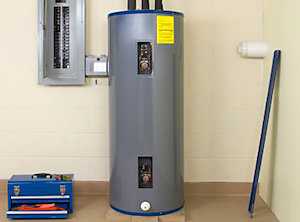3 WAYS TO SPOT A WATER HEATER PROBLEM

Your water heater is one of the most essential appliances in your home. It provides hot water for showers, dishwashing, laundry, and more. Because you use it daily, it’s important to recognize the early signs of trouble before they turn into costly repairs or a full system replacement.
Here are three common signs that your water heater might have a problem and what you can do about it.
1. No Hot Water or Inconsistent Heating
Few things are more frustrating than stepping into a hot shower only to have it turn cold. If your home suddenly has no hot water, the issue could be simple or a sign of a larger problem.
Possible Causes & Quick Fixes:
- Excessive Hot Water Use: If multiple people or appliances (like a dishwasher or washing machine) have recently used hot water, your tank may need time to reheat. Wait about 30–60 minutes and check again.
- Tripped Breaker: If you have an electric water heater, check the circuit breaker. A tripped breaker can shut down the heating element, preventing water from warming up.
- Pilot Light Out: If you have a gas water heater, the pilot light may have gone out. Relight it according to the manufacturer’s instructions, or contact a plumber if it won’t stay lit.
- Sediment Buildup: Over time, minerals in the water can settle at the bottom of the tank, reducing heating efficiency. If you frequently run out of hot water, flushing the tank might help.
When to Call a Plumber:
If the problem keeps happening or you frequently run out of hot water, you may need a larger water heater or a tankless water heater to better suit your household’s needs. A professional plumber can help assess whether your unit is properly sized or if a repair is needed.
2. Your Hot Water Smells Strange
If your hot water smells like rotten eggs or sulfur, this could be a sign of bacteria inside your water heater. This issue is especially common in homes that use well water, but it can also happen in municipal water systems.
Possible Causes & Solutions:
- Bacteria Growth: In some cases, harmless but foul-smelling bacteria can develop inside the tank. Raising the water temperature to at least 140°F for a few hours may help kill bacteria.
- Anode Rod Corrosion: Water heaters contain a metal rod called an anode rod, which prevents rust inside the tank. If this rod is corroding, it can create a sulfur-like smell. Replacing the anode rod can often fix the issue.
- Rust in the Tank: If your water also has a reddish or brownish tint, corrosion inside the tank might be the culprit. Rusty water is a sign that the tank is deteriorating and may soon need to be replaced.
When to Call a Plumber:
If you notice persistent odor issues, discoloration, or signs of corrosion, a professional plumber can inspect your system, flush the tank, and replace the anode rod if necessary.
3. Water Leaks Around the Water Heater
Water pooling around your water heater is never a good sign. Even small leaks can lead to bigger problems like mold, water damage, and higher utility bills.
Possible Causes & What to Do:
- Loose Valves or Connections: Check the drain valve at the bottom of the tank and the pipes leading to and from the heater. If they’re loose, carefully tighten them with a wrench.
- Faulty Temperature & Pressure (T&P) Valve: The T&P valve is a safety mechanism that releases excess pressure. If it’s faulty, it could be leaking. This should be addressed by a plumber.
- Tank Corrosion or Cracks: If your tank itself is leaking, it may be rusting from the inside. Unfortunately, a leaking tank cannot be repaired and will need to be replaced.
When to Call a Plumber:
If you notice consistent dripping, pooling water, or corrosion, call a plumber immediately. Ignoring a leak can lead to bigger issues, including a complete system failure or flooding.
Need Water Heater Repair in Atlanta?
If you’re experiencing any of these issues—or other problems like strange noises, fluctuating water temperatures, or higher energy bills—don’t wait for the problem to get worse. Contact Ragsdale, a trusted plumber in Atlanta for a professional water heater repair or replacement.
Related Reading
Join Our Email Newsletter
Receive updates, current news, promotions, and industry tips.
